The Harmony of Bill Evans (2a) PERI’S SCOPE – HARMONIC ANALYSIS
“Peri’s Scope” is a perfect model to initiate a discussion of two-handed piano voicing principles that are root oriented. There are three rules or directions to follow:
- Use the root, third and seventh under the melody;
- Omit the fifth of the chord;
- For added, optional color, add a ninth, eleventh, or thirteenth
Best Sheet Music download from our Library.
Observe in all of the examples that the root is always the bass note and above the root you place the third, seventh, and melody. The voice leading alternates-EX. 1: R (root), 3rd, 7th leading to R, 7th, 10th in measures 1 and 2; or R, 10th, 7th leading to R, 7th, 10th in measure 3- depending upon the root movement.
In this tune the root movement is mostly down a fifth ( or up a fourth, i.e. II-V, III-VI of measures 1 & 2). I call this the diatonic cycle of fifths, and since “Peri’s Scope” does not modulate to another key, I rate it as a very imaginative diatonic composition for that reason.
Bill had a composer’s ear for variety and learned how to effectively use secondary dominants (see measures 7, 8, 14, 15, 16 & 20). This makes Peri’s Scope a challenge to the improviser. The challenge is unique because you meet the secondary dominants in different ways and in different parts of the phrase.

For example, in EX. 2 below, the IIIx (E secondary dominant seventh) lasts for two bars (7 & 8) and it’s the climax of the first phrase of the tune. It’s very sudden. It jumps out at us.

E7 (Sec. Dom.) E7 FMa7
From Bar 1 to 6 all we heard were diatonic chords in C Major, then “boom!”, we’re hit with an E713 for two bars. A real surprise. Look at EX. 2 and see and hear the colors:1 .E713, then E7b13, then E7 and finally E7+ 11 !!
At the end of the second phrase ( also eight measures), EX. 3 measures 14, 15 & 16, we meet three secondary dominants in a row, B713 to E9+11 to A713!!! The alterations on the Illx at measure 15 begin to look and sound like its tritone substitute, a B flat dominant seventh +5.
It is at this point the improviser has a choice to use one or the other: an E913 or Bb9+5. Here the progression becomes chromatic if you use the Bb9 and remains diatonic if you use the E911.
In this second phrase, measures 14-16, the improviser has a choice to think diatonically by using B7 to E7 to A7, or chromatically B7 to Bb7 to A7. A chromatic progression is one in which the root of the chord lies outside the key signature of the tune. All others are diatonic progressions.

In phrase three, at bar 20 of the final e1ght measures (EX. 4), we meet a secondary dominant for one-half of the measure only. It is the Vlx (A7b13) again on the 3rd and 4th beats. In Bill’s improvisation in this measure he plays B-flats, revealing to us that the chord on the downbeat of measure 20 is an E minor 7bs, a III half-diminished. It is only implied in this arrangement. The symbol for half-diminished is 0. The symbol x stands for secondary dominant.
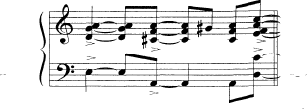
In EX. 5, we can see at a glance how imaginatively Bill used the secondary dominants in different parts of each phrase. Here’s a look at the phrases by measure -number. – It will give you a quick overview of whererhe secondary dominants occur.
EX. 5 Peri’s Scope
Phrase One (measure s 1-8)
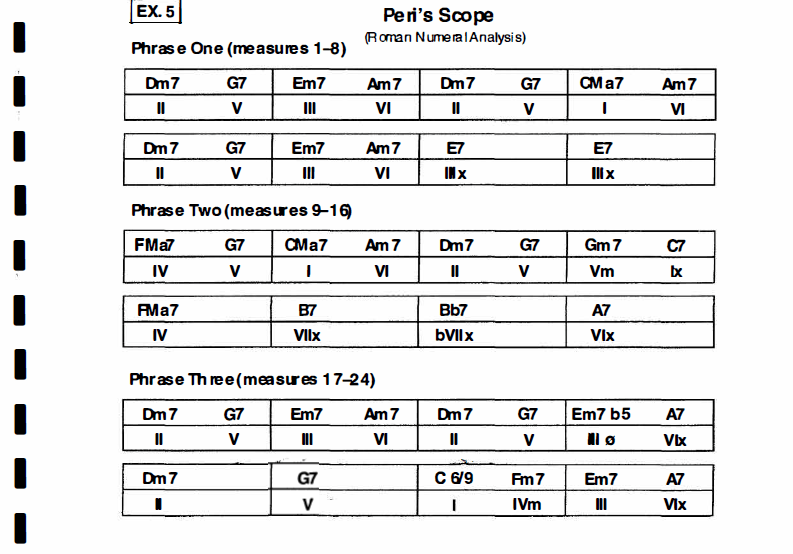
When I teach tunes, especially Bill’s, I always analyze the phrase structure first, then the key changes, if any (modulation principles), and then the use of secondary dominants, how they resolve and their duration. For example, the A7′ sat measures 16 and 20 resolve to the D minor chord, and we can infer that it is borrowed from the region or scale of D minor, which is only one flat removed from C Major, the scale or key of “Peri’s Scope.”
In other words, the A7 suggests the key, the scale or “the region of” D minor, which is very closely related to the tonic key of C Major. I include in my thinking the relative major keys when discussing minor key relationships and relative minor keys when discussing major keys.
This sounds confusing, I know, but as I analyze other compositions by Bill, you’ll begin to grasp the principles I’m trying to explain. In fact, if you pick up the Theory of Harmony by Arnold Schoenberg, you will find out where Bill learned these principles and you’ll be able to follow my explanations more intelligently.
Now go back and look at EX. 2, measures 8 & 9. The E7 at measure 8 resolves to an F Ma7 at measure 9. This E7 is borrowed from the scale of A minor, the relative minor of C Major, and it resolves deceptively, i.e. V to VI, or up a half step” as if” it were in the key of A minor.
These are important considerations when studying this tune in terms of its horizontal or linear implications. We know that E7 is the dominant of A Major and A minor. But we probably wouldn’t improvise on an A major scale at this point for two reasons: 1) the chords surrounding the E7 do not suggest a progression in A major, and 2) the resolution at measure 9 would have to be to an F# m7, the VI of A major, a deceptive resolution in the key of A major!
Let’s get back to the voicing concepts. In EX. 2, measures 7 & 8, the voicing of the E7 is root, 7th, 10th (or 3rd), and in measure 9, the F Ma7 and G7 voicings are the same (R, 7th, 10th) because the root movement is stepwise, lllx to IV to V. When progressions move by steps (IV-V or 11-111, etc.), you can often move or lead the voices parallel. This makes for smoothness and clarity in the rendition of the tune. Any song will lend itself to this treatment. I call this the 3-note voicing concept and I learned it from Bill’s model, “Peri’s Scope.”
In EX. 3, measure 14, the B7 is voiced root, 7th, 10th resolving to E7. The E7 here is the only voicing in our model that has no root. Or does it? I think Bill meant Bb7+5 at this point (last beat of measure 14). The B-natural in the bass was supposed to be a B-flat but was delayed to the next bar, measure 15, second beat.
What do you think? If you accept my analysis, then the voicing to the Bb7 is parallel -R, 7th, 10th-and the resolution from Bb7 to the A7 in measure 16 is also parallel-R, 7th, 10th. Here’s a look at these three chords in isolation (EX. 6). Play them!
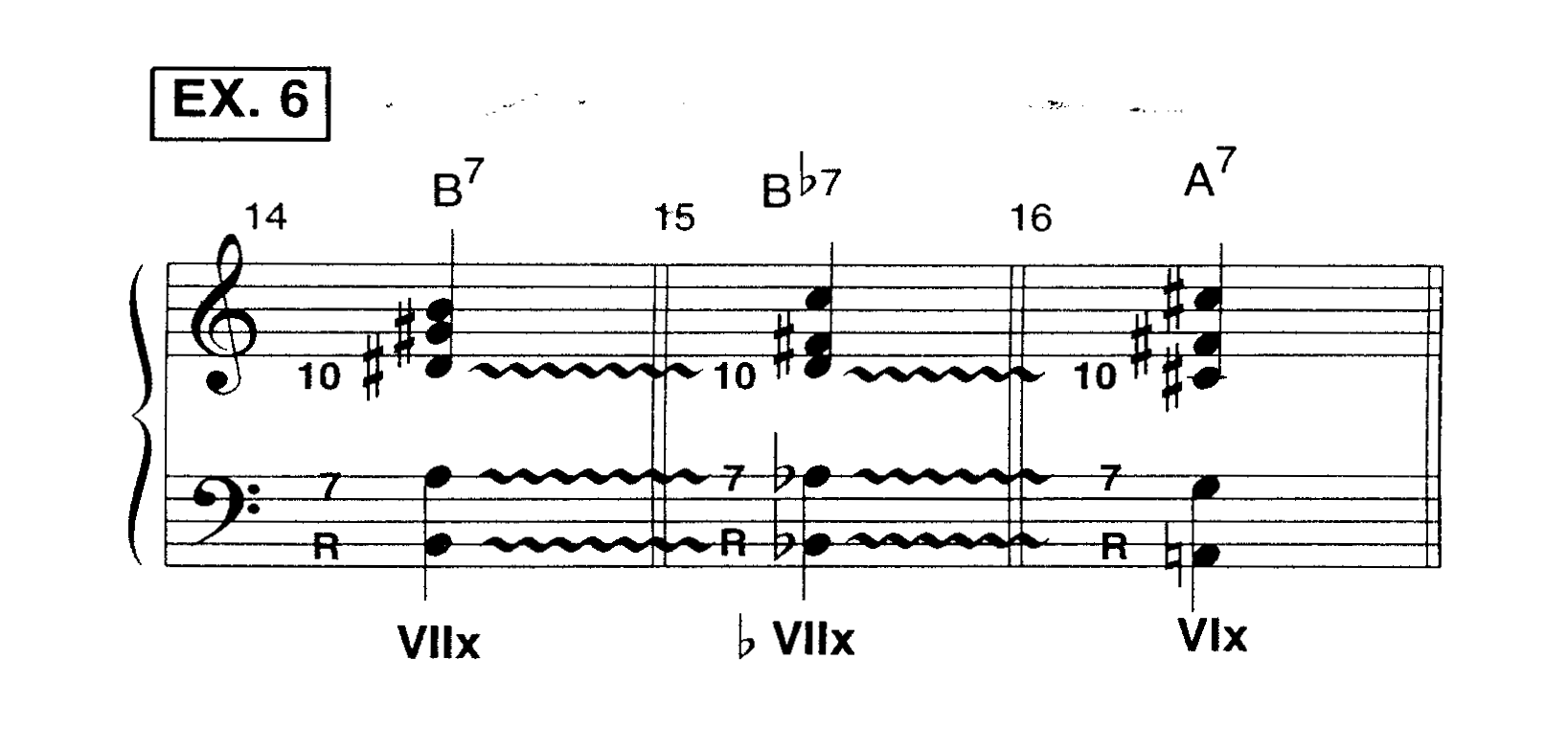
In EX. 7, measure 11, we see another variation in Bill’s voicings, and a very simple one at that. He reduces the left hand voicing to two notes: Rand 7th on the downbeat (D m7) and then R, 3rd on the third beat (G 7), while the melody in the right hand is harmonized in thirds. This gives us relief from the five part voicings in phrase one.
Later performames of this piece, Bill changed measure 12 to Gm 7, C7, suggesting that the middle phrase (phrase two, measures 9-16) can be heard as a modulation to the key of F Major, a very closely related key to C Major, one fifth down and one flat away from C Major.

These root-oriented 3-note voicing concepts formed the foundation of Bill’s early style and permeated his later playing, as you will see in my analysis of tunes like “B Minor Waltz.”
Please, subscribe to our Library.
If you are already a subscriber, please, check our NEW SCORES’ page every month for new sheet music. THANK YOU!
In EX.8, measures 20 & 21, we observe more variety, the block chord voicing with melody on top and bottom. Bill knew his jazz piano history. I heard him play Boogie Woogie and Teddy Wilson styles in 1951. The block chord influences are from Milt Buckner and George Shearing.
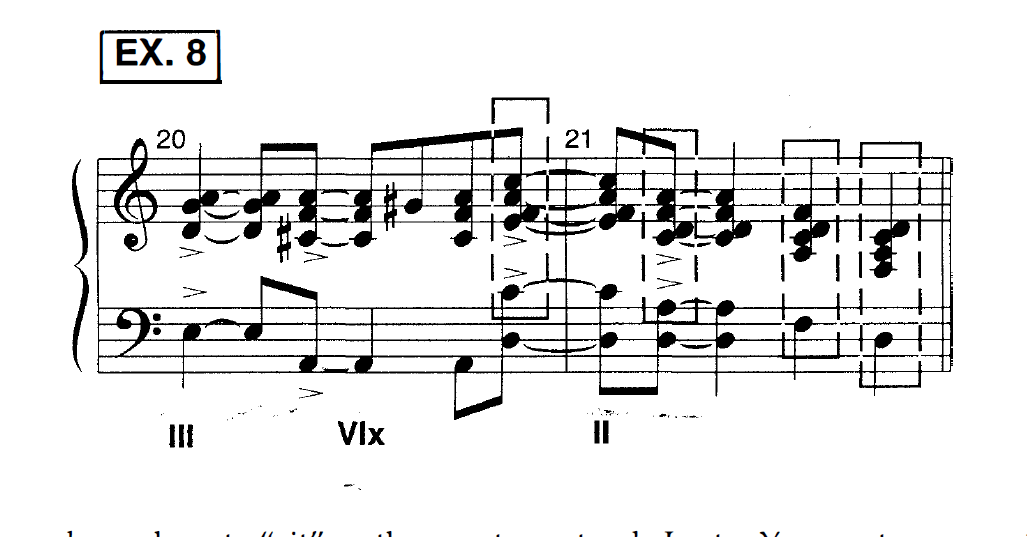
And Bill even knew how to “sit” on the quarter note a la Lester Young at measure 19 to make it swing in the old style ( EX. 9). Listen to Lester Young’s solos on “Taxi War Dance” or “Blue Lester” with the Count Basie Orchestra for the quarter note swing “feel.”
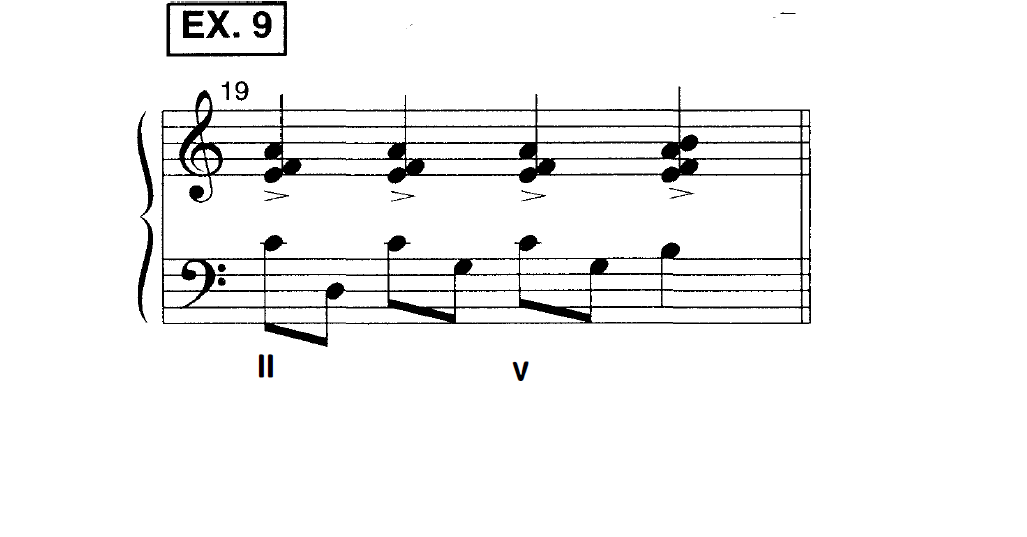
Notice the Boogie Woogie influence in the left hand of measure 19, the ultimate in sophistication. Bill truly “ingested” all the jazz styles of the past, and they appear spontaneously in his writing and playing in extremely subtle ways.
As a student of composition in the 50s, he “ingested” all the classical music of the past. In 1951, I heard him sightread, at the piano, the orchestral score to Stravinsky’s “Rite of Spring.” Of course, Bill’s intuition is at play here; this is a welcome relief from all that rhythmic displacement, tension and syncopation in the previous phrase (EX. 10, measures 13-16.)
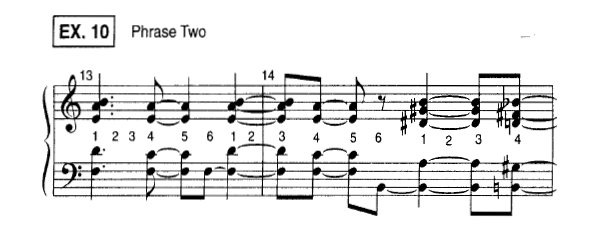

I have made EX. 10 easier to learn: Let’s look at my voicing-arrangement (EX. 11) to explain what I mean. What I did was to notate in 6/8 what Bill notated as rhythmic displacement. I have subdivided the beat and createdrour measures in 6/8outofBill’s three measures in4/4.
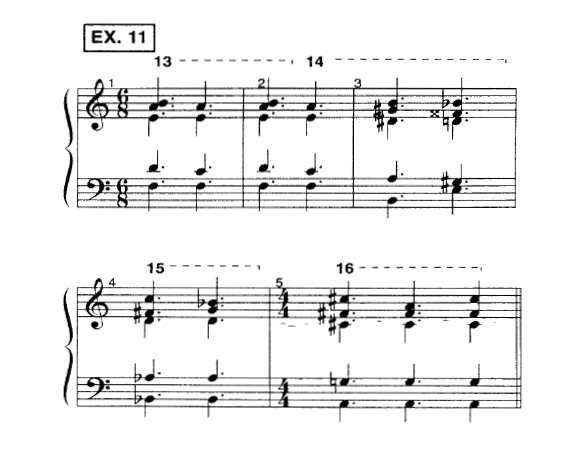
Bill may have conceived of this tune diatonically, but his use of rhythmic displacement in phrase two makes the tune unmanageable for a beginner in improvisation unless_he “evens out” those measures (see EX. 5, measures 13-16). Each phrase has wonderful variety of harmonic color (the addition of 9ths, 11ths, and 13ths ), and unusual phrasing ‘· in the melody and in the piano voicings.
To conclude the article and at the same time offer you a recapitulation of the 3-note concept, here are two examples I use in teaching the Blues in F. In EX. 12, which you can analyze for yourself, you will see that I connect the chords by observing the voice leading rules explained earlier in this article.
Analyze also EX. 13 and observe the addition of one color tone (9,11,13) above each of the 3-note voicings. (I make students write as many variations as possible using the color tones). Try singing “Billie’s Bounce” melody while playing examples 12 & 13; or “Blue Monk,” or have a friend play and improvise with you.
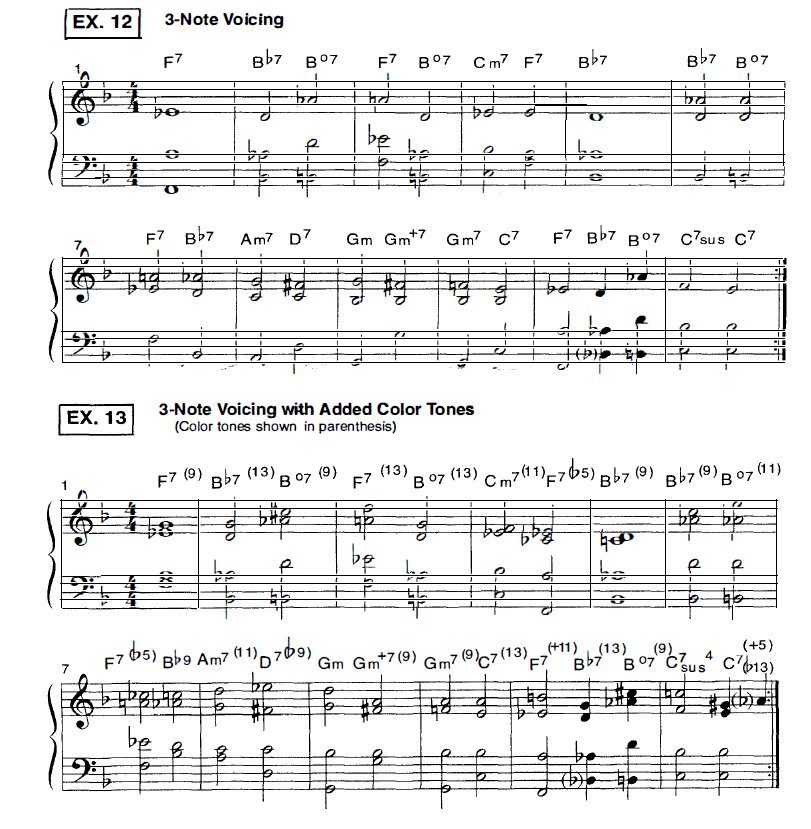
EX. 14 is the opening theme from the “Concertina for Strings and Piano,” third movement, titled “Resurrection”, orchestrated brilliantly by Jack Six and premiered in December 1980, in Plainfield, New Jersey, Bill’s hometown. The Concertina is dedicated to Bill’s memory. In “Resurrection” you have a 3-note voicing arrangement of this very simple theme and yet it still sounds complete and satisfying.
Incidentally, in this third movement, the piano soloist is called upon to invent variations on this theme, therefore the 3-note setting in the exposition of the movement creates a clear and solid statement of the theme. Bill was a master at arranging the opening chorus to set the mood for the listener in a positive and clear manner.
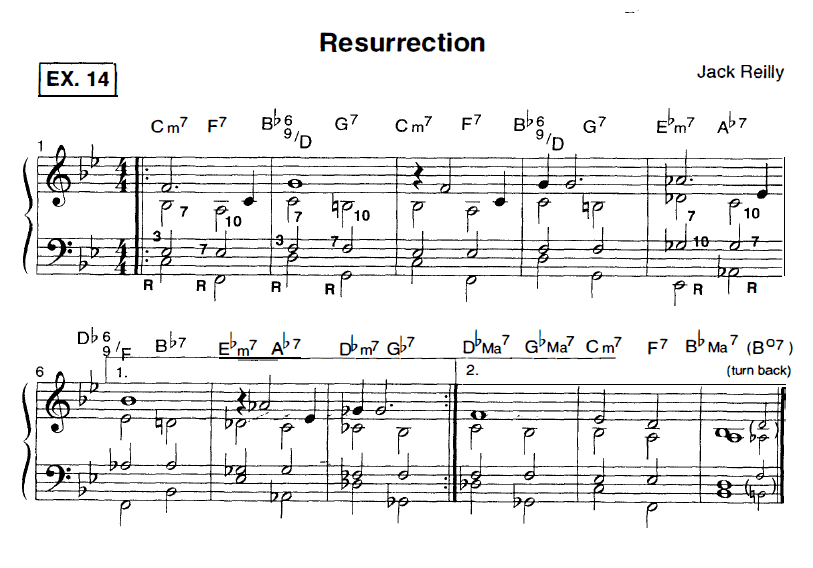
The final example (EX. 15) is an illustration of a more elaborate method of study for “Peri’s Scope” and all of Bill’s tunes, and in fact any tune, and that is to arrange the progression in 4, 5, 6, 7, or 8 parts in half-note chorale style.
Bill would write out three or four examples like this and then practice them in all keys. For “Peri’s Scope,” I used the 3-note concept, adding a fourth part chosen by” ear,” but notice that the soprano or top note I have chosen suggests or outlines the melody shown in the top staff. This is a good first step to get “inside” the tune. In the articles that follow, I will show many other procedures.
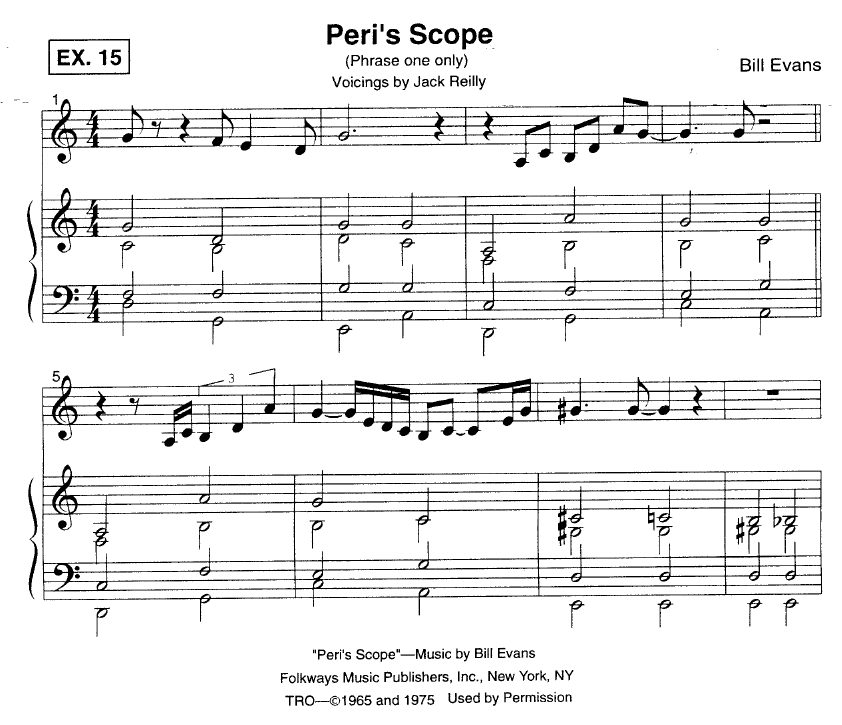
Browse in the Library:
| Artist or Composer / Score name | Cover | List of Contents |
|---|---|---|
| Alan Silvestri Contact Main Thitle Piano Solo |
 |
|
| Alan Silvestri The Avengers |
 |
Alan Silvestri The Avengers |
| Alan Walker – Faded |
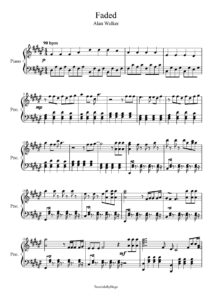 |
|
| Alan-Menken – Enchanted (Disney) |
 |
Enchanted Piano Vocal Guitar |
| Alanis Morisette – Hand In My Pocket | ||
| Alanis Morisette – Hands Clean | ||
| Alanis Morisette – Ironic | ||
| Alanis Morisette – Thank You | ||
| Alanis Morisette – That I Would Be Good | ||
| Alanis Morisette – Uninvited | ||
| Alanis Morisette – You Oughta Know | ||
| Alanis Morrissete You Oughta Know Sheet Music |
 |
|
| Alban Berg – Schliesse Mir Die Augen Beide (Musescore File).mscz | ||
| Alban Berg – Schliesse mir die Augen beide (Piano and voice Noten) |
 |
|
| Albeniz Isaac – Tango In D – Para Piano | Albeniz, Isaac – Tango In D – Para Piano | |
| Albeniz For Acoustic Guitar with Audio MP3 by Laurindo Almeida |
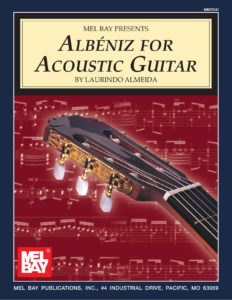 |
Albeniz for acoustic guitar with audio MP3 |
| Albeniz Suite Española V (Musescore File).mscz | ||
| Albéniz, Isaac – Capricho Catalán (Op. 165 no. 5) (Guitarra – Guitar) |
 |
|
| Albéniz, Isaac – Capricho Catalán (Op. 165 no. 5) (Piano) |
 |
|
| Albert Ammons 5 Boogie Woogie Piano Solos Sheet Music |
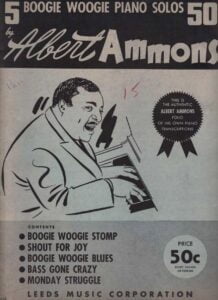 |
Albert Ammons 5 Boogie Woogie Piano Solos Sheet Music |
| Albert Ammons – Boogie Woogie Stomp |
 |
|
| Albert Ammons – Monday Struggle | Albert Ammons – Monday Struggle | |
| Albert Ammons – Shout For Joy | Albert Ammons – Shout For Joy | |
| Albert Ammons – Swanee River Boogie Woogie |
 |
|
| Albert Harris Sonatina Guitar Solo |
 |
|
| Albert Harris Variations And Fugue On A Theme Of Haendel (Guitar) |
 |
|
| Albert King The Very Best Of Albert King (Guitar TABs) |
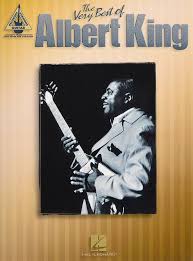 |
Albert King The Very Best Of Albert King |
| Albert Lee – The Best Of Albert Lee Guitar Tabs |
 |
Albert Lee – The Best Of Albert Lee Guitar Tabs |
| Albinoni – Adagio (Piano Solo Version) |
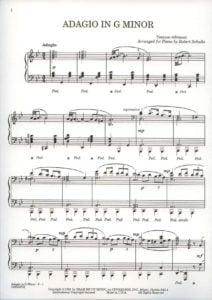 |
|
| ALBINONI-Adagio |
 |
|
| Album of Russian piano music | Russian music 1 | Russian music 2 |
| Album Of Scandinavian Piano Music By Louis Oesterle Vol. 1 (25 Pieces) 1902 |
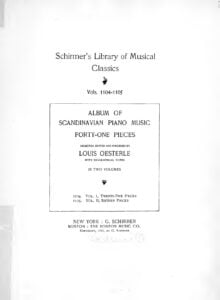 |
Album Of Scandinavian Piano Music By Louis Oesterle Vol. 1 (25 Pieces) 1902 |
| Alegre Magín – Americana (Guitarra) Habanera (Musescore File).mscz | ||
| Alegria Cirque Du Soleil Piano Vocal Guitar Chords Sheet Music |
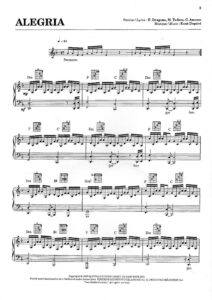 |
|
| Alejandro Sanz – Amiga Mia | ||
| Alejandro Sanz – La Margarita Dijo No | ||
| Alejandro Sanz – Y Si Fuera Ella | ||
| Aleksander Vertinskiy songbook |
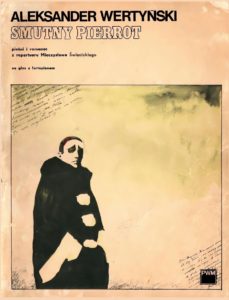 |
Aleksander Vertinskiy songbook |
| Alex North – Spartacus Love Theme (piano sheet music) |
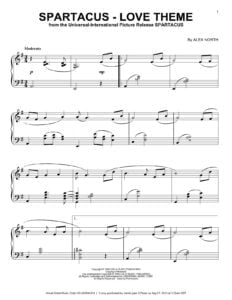 |
Alex North Spartacus Love Theme |
| Alex North Spartacus Love Theme (Lead sheet) | Alex Norrth SpArtacus | |
| Alexander Scriabin 24 Preludes Op. 11 1 To 12 Musescore File.mscz | ||
| Alexandra Streliski Burnout Fugue |
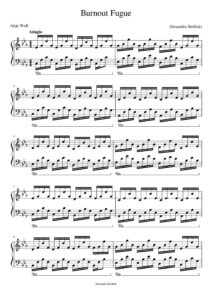 |
|
| Alexandra Streliski Le Noveau Dèpart |
 |
|
| Alexandra Streliski Par La Fenêtre De Théo |
 |
|
| Alexandra Streliski Plus Tôt |
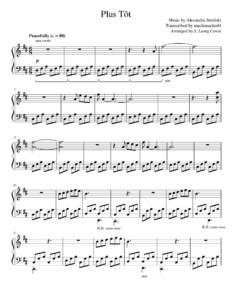 |
|
| Alexandra Strevisky Pianoscope |
 |
Alexandra Strevisky Pianoscope |
| Alexandre Desplat Elisas Theme Piano from The shape of water |
 |
|
| Alexandre Desplat The Shape Of Water Main Theme |
 |
|
| Alexandre Desplat – Lust Caution |
 |
Alexandre Desplat – Lust Caution |
| Alexandre Desplat – The Imitation Game |
 |
|
| Alexandre Desplat – The Meadow New Moon Piano solo Sheet Music |
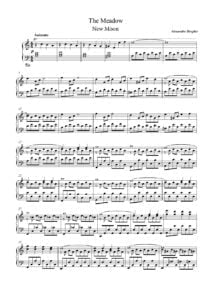 |
|
| Alexandre Desplat Almost A Kiss (From The Film New Moon) |
 |
|
| Alexandre Desplat and Lang Lang Kitty,s Theme from The Painted Veil | Alexandre Desplat and Lang Lang Kitty,s Theme from The Painted Veil | |
| Alexandre Desplat Brunos Theme From Suite Fran?aise |
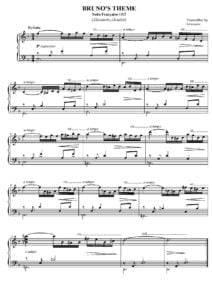 |
|
| Alexandre Desplat Full Moon (From The Film New Moon) |
 |
|
| Alexandre Desplat My Week With Marilyn – Marilyn’s Theme |
 |
|
| Alexandre Desplat Ost Godzilla Main Theme |
 |
|
| Alexandre Desplat The Danish Girl Theme Piano Solo |
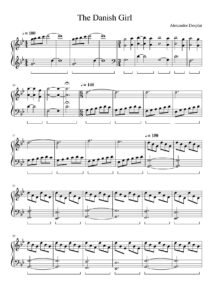 |
|
| Alexandre Desplat The Imitation Game |
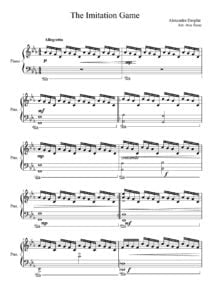 |
|
| Alexandre Desplat The King Speech |
 |
Alexandre Desplat The King Speech |
| Alexandre Desplat The Power Plant from Godzilla |
 |
|
| Alexandre Desplat The Wonder Of Life |
 |
|
| Alexandrov Piano Works Vol I |
 |
|
| Alexandrov Works for Piano Vol II |
 |
|
| Alexandrov Works for Piano Vol III Sonatas |
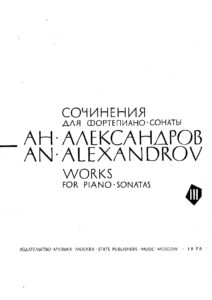 |
|
| Alexandrov, Anatoly 6 Preludes For Piano Op. 1 (1961) |
 |
|
| Alexis Ffrench – Bluebird |
 |
|
| Alfred Basic Adult Christmas Book Level 1 |
 |
|
| Alfred Basic Repertoire Level 4 |
 |
|
| Alfred Brendel A Pianists A-Z A Piano Lovers Reader Book |
 Andrew Hill 21 Piano Compositions Andrew Hill 21 Piano Compositions |
|
| Alfred’s Basic Adult Piano Course Level 1 |
 |
Lessons Alfred’s Basic Adult Piano Course Level 1 |
| Alfred’s Basic Adult Piano Course Level 2 |
 |
Lessons Alfred’s Basic Adult Piano Course Level 2 |
| Alfred’s Basic Adult Piano Course Level 3 |
 |
Lessons Alfred’s Basic Adult Piano Course Level 3 |
| Alfred’s Basic Piano Level 2B |
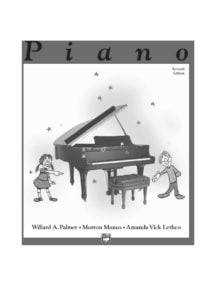 |
|
| Alfred’s Basic Piano Level 4 Jazz Rock Course |
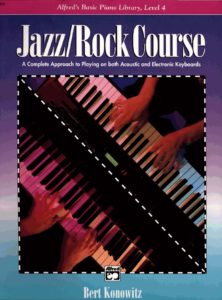 |
|
| Alfred’s Basic Piano Library Essentials Of Jazz Theory Book 2 |
 |
Alfred’s Basic Piano Library Essentials Of Jazz Theory Book 2 |
| Alfred’s Basic Piano Library – Solo Book Complete Levels 2 & 3 for the later beginner |
 |
Alfred’s Basic Piano Library – Solo Book Complete Levels 2 & 3 for the later beginner |
| Alfred’s Basic Piano Library – Top Hits! Solo Book – Level 4 |
 |
|
| Alfred’s Basic Piano Library Essentials Of Jazz Theory Book 1 |
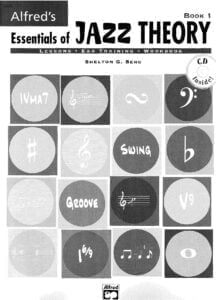 |
Alfred’s Basic Piano Library Essentials Of Jazz Theory Book 1 |
| Alfred’s Basic Piano Library Essentials Of Jazz Theory Book 3 |
 |
Alfred’s Basic Piano Library Essentials Of Jazz Theory Book 3 |
| Alfred’s Basic Piano Library Lesson Book Level 3 |
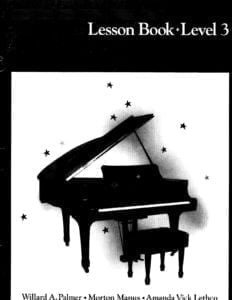 |
|
| Alfred’s Teach Yourself To Play Guitar Everything You Need To Know To Start Playing The Guitar! (with Tablature) |
 |
|
| Alfred’s Essentials Of Music Theory, Complete (Andrew Surmani, Karen Farnum Surmani Etc.) Sheet Music |
 |
|
| Ali and Nino (Dario Marianelli) | ||
| Alice Coltrane Monument Eternal (book) The Music of – by Franya J. Berkman |
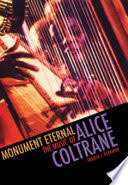 |
|
| Alice In Chains Dirt Full album Guitar TAB with lyrics |
 |
Alice In Chains Dirt Full album Guitar TAB with lyrics |
| Alicia Keys – A Woman’s Worth | Alicia Keys – A Woman’s Worth | |
| Alicia Keys – A Womans Worth | ||
| Alicia Keys – And I | ||
| Alicia Keys – As I Am (Songbook) |
 |
ALICIA KEYS SONGBOOK |
| Alicia Keys – Butterflyz | ||
| Alicia Keys – Diary | ||
| Alicia Keys – Fallin | ||
| Alicia Keys – Fallin’ (Sheet Music – Piano) | Alicia Keys – Fallin’ (Sheet Music – Piano) | |
| Alicia Keys – Goodbye | ||
| Alicia Keys – How Come You Dont Call Me | ||
| Alicia Keys – If I Aint Got You |
 |
|
| Alicia Keys – Impossible | ||
| Alicia Keys – Never Felt This Way | ||
| Alicia Keys Diary Song Book |
 |
ALICIA KEYS DIARY SONGBOOK |
| Alicia Keys The Element Of Freedom Songbook |
 |
ALICIA KEYS |
| Alicia Keys Unplugged |
 |
ALICIA KEYS UNPLUGGED |
| Alkan, Charles Valentin Concerto For Solo Piano 1st Movement Opus 39 No. 8 In G Minor (Piano Solo Reduction) |
 |
|
| All 4 One – I Can Love You Like That | ||
| All 4 One – I Swear | ||
| All American Folk Complete Sheet Music Editions Volume One (Creative Concepts Publishing Corp.) |
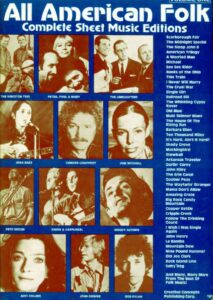 |
All American Folk Complete Sheet Music Editions Volume One (Creative Concepts Publishing Corp.) ( |
| All Blues For Jazz Guitar Comping Styles Chords And Grooves by Jim Ferguson Guitar Tablature |
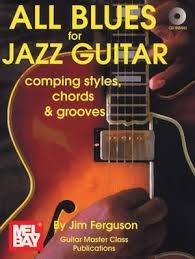 |
All Blues For Jazz Guitar Comping Styles Chords And Grooves by Jim Ferguson Guitar Tablature |
| All Blues Soloing For Jazz Guitar – Jim Gerguson Play Along (Book + audio MP3) with Tablature |
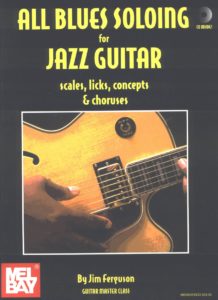 |
All Blues Soloing jazz guitar |
| All By Myself – Celine Dion (Musescore File).mscz | ||
| All I Want For Christmas Is You (Musescore File).mscz | ||
| All Of Me – Jazz Standard Stride Piano arr. Gerald Marks and Seymour Simons | All of me (Gerald Marks and Seymour Simons) Jazz Piano Solo arr. sheet music | |
| All Of Me – Jazz Standard Stride Piano Arr. Gerald Marks And Seymour Simons (Musescore File).mscz | ||
| All Of Me Fingerstyle Guitar TABs By Lucas Brar Jazz Standard (Gerald Marks and Seymour Simons) | All Of Me Fingerstyle Guitar TABs By Lucas Brar Jazz Standard | |
| All Of Me Gerald Marks & Seymour Simons 1931 Jazz Standard (Vintage sheet music) | All Of Me Gerald Marks & Seymour Simons 1931 Jazz Standard (Vintage sheet music) | |
| All Of The Jazz Standard Vol. 1 |
 |
All Of The Jazz Standard Vol. 1 |
| All Of The Jazz Standard Vol. 2 |
 |
All Of The Jazz Standard Vol. 2 |
| All Saints – Never Ever | ||
| All Sondheim Vol I Music and lyrics |
 |
All Sondheim Vol I Music and lyrics |
| All Sondheim Vol II Music and lyrics |
 |
All Sondheim Vol II Music and lyrics |
| All Sondheim Vol III Music and lyrics |
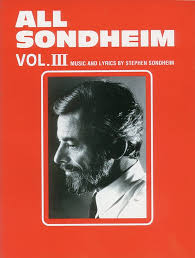 |
All Sondheim Vol III Music and lyrics |
